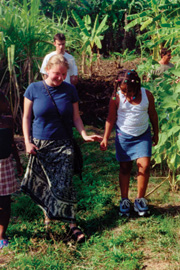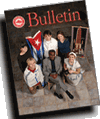
Ingenuity recreates a nationCuba SSTAccording to a common Cuban saying, one must invent to survive, whether that means fashioning a filter out of a stocking or making a purse out of two pieces of wood. For the inaugural Study-Service Term unit in Cuba, 22 Goshen College students adapted the attitude of the resourceful Cubans they met, taking responsibility for their own experiences. Senior Tom Kelley of Goshen, 2002 graduate Dan Lanctot of Bristol and Mark Gingerich of Iowa City, Iowa, wanted to learn about the Cuban entertainment industry. So SST faculty leader Carlos Romero, former GC vice president for student life, set up a meeting between his landlord and the students; the landlord happened to be a Cuban television writer. Julia Hershberger, a junior music major from Canton, Ohio, whose instrument is the flute, wanted to learn about Cuban music. She set up a lesson with the first-chair flutist of the National Symphony Orchestra. While each student learned about Cuban experiences in their chosen discipline, they also learned how Cubans make do with very little. Cuban ingenuity"If they can't fix it in Cuba, it can't be fixed," said Romero. Before leaving for Cuba last April, Romero's wife Celina scurried from eye doctor to eye doctor, desperately trying to repair her broken glasses. Not only could they not be fixed, she was told, but she had to see the eye doctor before they would sell her another pair. She fixed them temporarily with Super Glue. When she arrived in Cuba, she took the glasses to a Cuban eye doctor; within 10 minutes, the pair was as good as new. It's Cuban ingenuity: when you don't have a lot, you make do with a little. Some used ingenuity to conserve. Junior Rebecca Allen's (Beaverton, Ore.) host mother ran her washing machine often, but didn't let the cycle finish so she could reuse the water in the next load. Gingerich said that the fact that Cubans have kept the same cars working for 50 years is a testament to their ingenuity as a country. "I think in many places where people are forced to be creative to get by, the population steps up to the task," Gingerich said. "But in a society such as our own, where we aren't really challenged to make things better for ourselves, it is almost a lost art." Lanctot was impressed with how a Cuban filmmaker he met was able to make an interesting movie with very limited funds. "The artistic vision shone through without special effects," Lanctot said. "They have so little money to do everything that they have to be extremely resourceful and very careful in spending money." Lanctot, Gingerich and Kelley's filmmaker friend was more interested in learning from them. "He was curious about American sitcoms and getting ideas from them that would transfer to Cuba," Lanctot said. Other methods of "making do" inclined toward the organic. On the farm that was a site for service for a number of the SST group members, the Cuban farmers used natural methods of preventing weeds and growing crops. Instead of using pesticides, the farmers planted sorghum around the fields - a sweet plant that attracts insects and keeps them from the crops. When in Cuba, do as the Cubans doEvery day Julia Hershberger waited at a bus stop, sometimes in vain, for a bus. When she arrived at the busy spot, she yelled out, "Quien es ultimo?" ("Who is at the end of the line?") Someone in the mass of people would grunt, signaling that he or she was the last in an arbitrary line. When another bus rider arrived, Julia would take her turn replying that she was at the end of the queue. Students had a number of transportation options available, such as cameos, peso taxis and bicitaxis - bicycles with a cart on the back for hauling passengers. Initially, getting around Cuba was tough, said Hershberger, but she eventually became accustomed to the system. "I was amazed at how the students were able to move around Havana," said Romero. "When we put on our North American lens, the system looks very complex." Along those same lines, Romero was impressed with how the students sought out cultural activities on their own. For example, a number of members from the group met a student at the University of Havana who took them to an apartment in a run-down building where Cubans met to play music together. "I wanted to learn more about music as part of the culture," said Emily Rodgers, a senior from Elkhart, Ind. "People just do it ë there's no competition." During each of the three times Rodgers returned to the apartment, she was encouraged to join in the music. She sang "Yesterday" by the Beatles, a Gillian Welch song and The Eagles' "Hotel California." "People just sit around and play, which doesn't happen here much." We are family - for a little whileUnlike most SST units, the students in Cuba could not be assigned permanent host families. But wanting students in Cuba to experience home life, Romero arranged for them to meet with host families at least once a week, and they sometimes made extra plans. Many of the students reported that the host families were excited not just to have an American in their homes, but to have the opportunity to extol the virtues of the Cuban people. "Having us in their home was a huge novelty," said Amanda Lind, a senior from Albuquerque, N.M. "They really wanted to demonstrate how generous the Cuban people are." Lind arranged an overnight stay with her host family, and was touched when the family offered her a bed. In the morning, she found out they had all slept on the floor. When her host father took her home that morning, she mentioned she had left behind her toothbrush in the family's bathroom. Later that day, her host father biked the distance of a 90-minute bus ride to return it. "As I talked to a number of the host families, I saw that the interaction with our students was an opportunity for them to show the people from the States that they are not enemies," Romero said. Other families used their time with the Goshen students as a chance to knot new families ties. The host mother that welcomed Kelley and David Harms, a visiting student to GC, was unable to have children, but had always dreamed of having one of her own. "When I saw her the last time," recalled Romero, "she was giving me thanks and crying, saying, 'For a time, you have given me the chance to have a family.'" |


